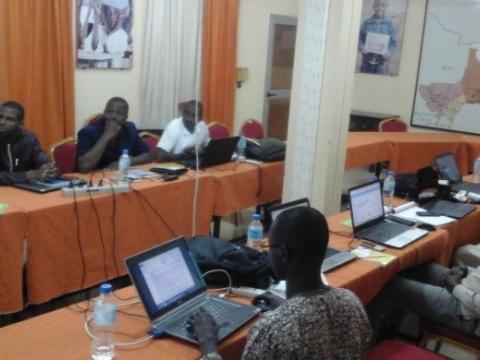Regreening Africa an actor of Farmer Managed Natural Regeneration

In Niger, the agricultural sector employs most of the population. In fact, more than 80% of the population practice agriculture and / or animal husbandry. These activities constitute the backbone of the national economy. Unfortunately, this sector confronted for decades with several constraints including among others: climate change, anthropogenic pressure, land degradation, etc. Facing this problem, development programs, projects and non-governmental organizations have intervening to provide appropriate solutions. Initially, these interventions were implemented without effective community involvement. Over time, development programs, projects, and non-governmental organizations have realized the importance of collaboration with local actors in order to achieve the assigned objectives. This is how all interventions are now developed and executed with the support of all stakeholders. As part of field activities implementation, development agents identify and disseminate good practices in carrying out actions to facilitate the adoption and scale-up of a technology. It emerged that The Farmer Manage Natural Regeneration is one of the most promising and least expensive practices in improving soil fertility in the Sahel in general and in Niger in particular. This practice started in Dan Saga village in Maradi region before spreading to other regions of Niger. Despite the promoted results, Niger did not have any policy or law governing the FMNR practice. This inadequacy hinders the promotion of this practice.
Regreening Africa Niger project is a five-year project funded by ICRAF through the European Commission whose implementing partners are World Vision and CARE which operate in the municipalities of Simiri, Ouallam and Hamdallaye in the Tillabéry Region. To achieve this goal, it puts forward an approach of scaling up agroforestry through FMNR supported by the treatment and enhancement of degraded pastoral and agricultural lands, the promotion of village nurseries, the promotion of agro-forestry value chains as well as policy advocacy with institutions in charge of regreening options. It is in this sense that a National Consultation and Coordination Committee called NOCC was created to influence decision-makers to adopt strong policies in favor of regreening of land.
It brings together around fifteen diverse members, including the Secretary General of the Ministry of the Environment, Urban Health and Sustainable Development whom chairs the said committee. Two meetings are held each year, however, it can be held in the event of an emergency.
To allow it to fully play its role, a ministerial decree was issued by the Minister of the Environment, Urban Health and Sustainable Development. This allows him to have legal recognition making it easier for him to carry out his missions. During these meetings, the Regreening Africa project noted a lack of a law regulating the management of FMNR practices in Niger. The committee took charge of this issue hence the adoption of decree N ° 2020-602 / PRN / ME / SU / DD of July 30, 2020 regulating the practice of FMNR on July 30, 2020. This is a significant step forward in motivating producers to practice it in their fields. Indeed, a special price is instituted for FMNR at the national level. Also, it should be noted a legal recognition of the supervisory committees. These play an important role in the adoption and monitoring of FMNR in the fields. If violations are reported by the supervisory committees or by a third party, they benefit from a transaction discount in accordance with the provisions of Order N ° 018 / MHE / FEF of 23 March 1992, related to the distribution of discounts on fines, transactions, damages and sale after seizure. This decree must be widely disseminated at the community level so that the communities take ownership of it.